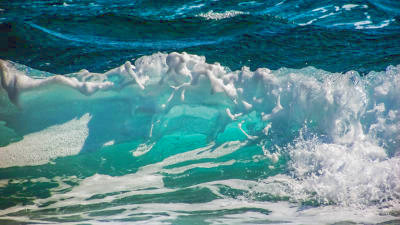← students

| First name: | Christiane |
| Last name: | Hassenrueck |
| Country: | Germany |

Thesis Subject:Implications of ocean acidification for microbial life and for microbial interactions with larger organisms
| Education: | |
| 2006-2009 B.Sc. Biology (University of Leipzig) | |
| 2009-2012 M.Sc. Biology (Carl von Ossietzky University, Oldenburg) | |
| Feb. 2011-Sep. 2011 Grad.Cert.Sc. Marine Biology (James Cook University, Townsville, Australia) |
Scientific Interests and Goals:Main scientific interests:
Molecular Ecology
Ocean Acidification
Microbial Marine Communities
Coral Ecology
My PhD thesis is part of the BMBF-funded BIOACID II project which aims to further elucidate the impact of ocean acidification (OA) on marine ecosystems following the first BIOACID project. I am investigating the effect of OA on microbial communities on tropical coral reefs in Papua New Guinea at natural shallow-water CO2 vents. These vents have been present for several decades and are locally enriching the area with CO2 lowering the pH of the water in that region and thus creating an in-situ laboratory to study long-term effects of OA.
I am looking at (1) changes in the diversity and structure of marine microbial communities as a function of naturally occurring acidification gradients, (2) the relationships between changes in community structure and the emerging properties of the biological systems (e.g. remineralization of organic matter, respiration), and (3) the extent to which these changes will affect associated organisms.
To accomplish these goals most of my work is based on molecular techniques such as Automated Ribosomal Intergenic Spacer Analysis (ARISA), functional gene analysis, enzymatic activity assays and high-throughput sequencing. The collaboration with other scientists from the MPI as well as several other institutes* is providing me with the opportunity to integrate my data with data on environmental parameters, biogeochemical processes and other reef organisms to create a comprehensive picture of how reef ecology will be affected by OA.
A second part of my thesis deals with the microbial community associated with Polar and Atlantic cod, two fish species that are the focus of the related BIOACID II consortium 4 at the AWI in Bremerhaven. Using the same molecular toolbox as described above I am investigating the impact of OA and ocean warming on the microbial community in relation to changes in the ecology of these fish species.
* University of Bremen, AWI in Bremerhaven, GEOMAR in Kiel, Australien Insitute of Marine Science in Townsville, National Oceanographic Center in Southampton
Molecular Ecology
Ocean Acidification
Microbial Marine Communities
Coral Ecology
My PhD thesis is part of the BMBF-funded BIOACID II project which aims to further elucidate the impact of ocean acidification (OA) on marine ecosystems following the first BIOACID project. I am investigating the effect of OA on microbial communities on tropical coral reefs in Papua New Guinea at natural shallow-water CO2 vents. These vents have been present for several decades and are locally enriching the area with CO2 lowering the pH of the water in that region and thus creating an in-situ laboratory to study long-term effects of OA.
I am looking at (1) changes in the diversity and structure of marine microbial communities as a function of naturally occurring acidification gradients, (2) the relationships between changes in community structure and the emerging properties of the biological systems (e.g. remineralization of organic matter, respiration), and (3) the extent to which these changes will affect associated organisms.
To accomplish these goals most of my work is based on molecular techniques such as Automated Ribosomal Intergenic Spacer Analysis (ARISA), functional gene analysis, enzymatic activity assays and high-throughput sequencing. The collaboration with other scientists from the MPI as well as several other institutes* is providing me with the opportunity to integrate my data with data on environmental parameters, biogeochemical processes and other reef organisms to create a comprehensive picture of how reef ecology will be affected by OA.
A second part of my thesis deals with the microbial community associated with Polar and Atlantic cod, two fish species that are the focus of the related BIOACID II consortium 4 at the AWI in Bremerhaven. Using the same molecular toolbox as described above I am investigating the impact of OA and ocean warming on the microbial community in relation to changes in the ecology of these fish species.
* University of Bremen, AWI in Bremerhaven, GEOMAR in Kiel, Australien Insitute of Marine Science in Townsville, National Oceanographic Center in Southampton


